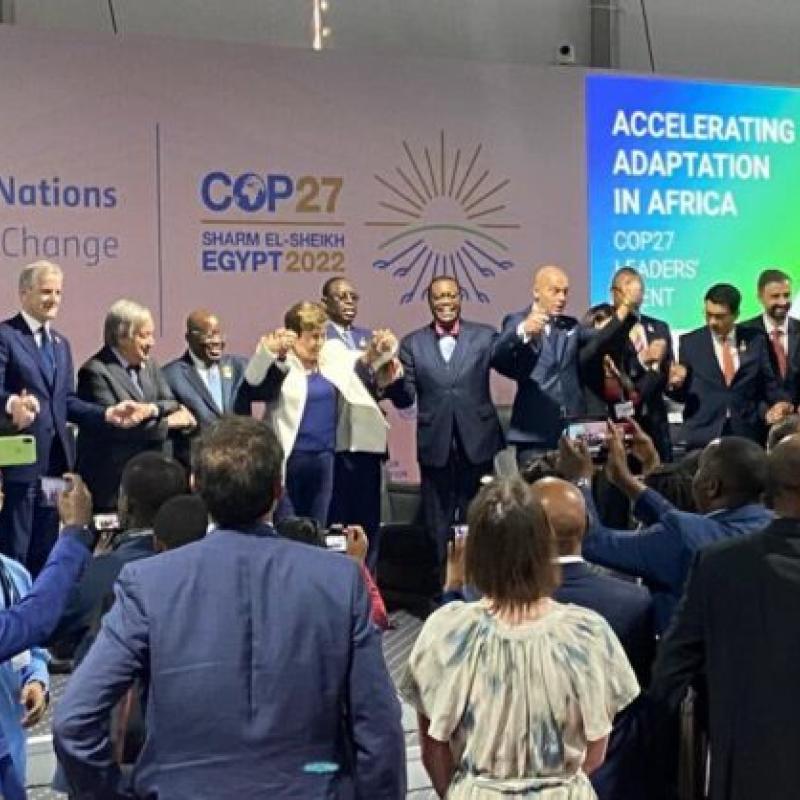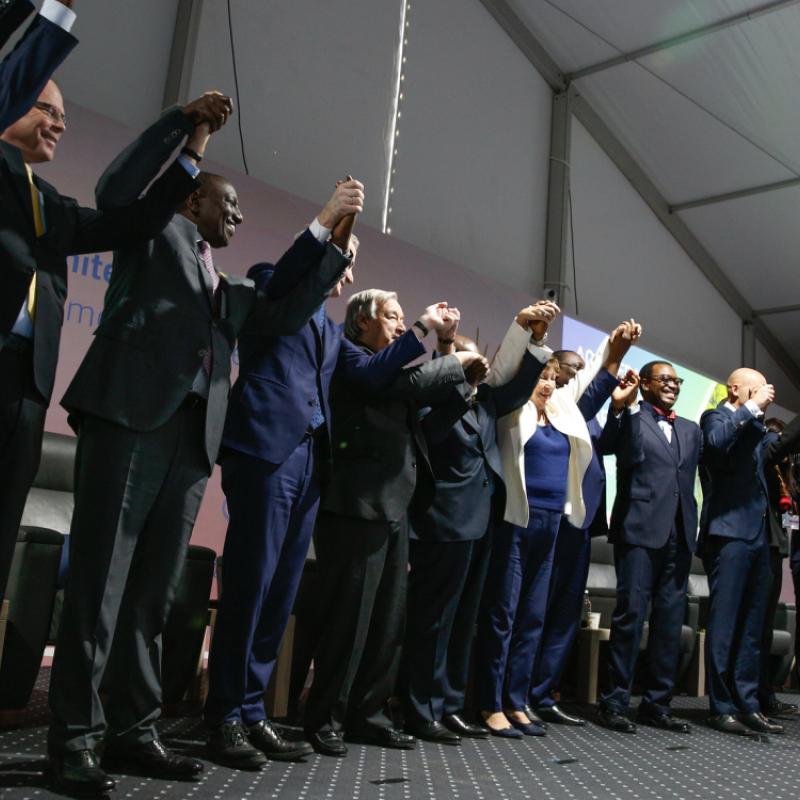
AAAP in the Media
Displaying 1 - 11 of 11
The Gambia: African Development Bank commits grants of $20.56 million to further upgrade Banjul port
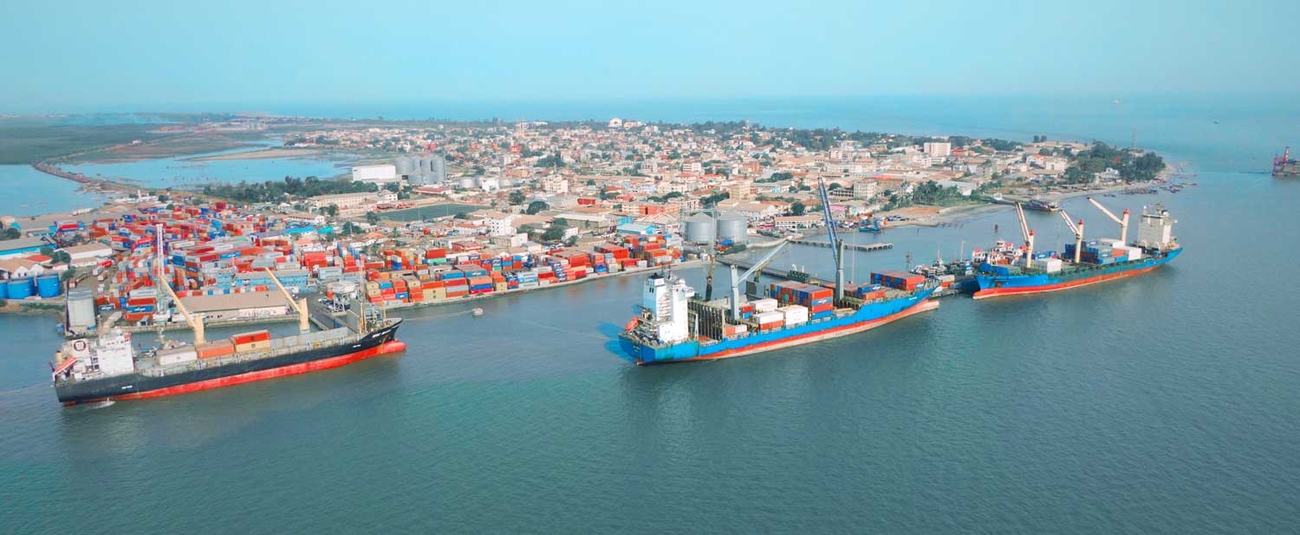
The Board of Directors of the African Development Fund (ADF), the concessional window of the African Development Bank Group, on Thursday approved grants worth $20.56 million to finance the fourth expansion of Banjul Port in The Gambia.
The funding comprises an ADF grant of $13.71 million and another $6.85 million grant from the Transition Support Facility window. The project will also receive a $450,000 grant from the Africa Adaptation Acceleration Programme (AAAP) a joint initiative of the African Development Bank and the Global Centre on Adaptation, for technical assistance to mainstream climate resilience into the expansion. AAAP will use cutting-edge climate analytics to identify and quantify the impacts of physical climate risk on the port infrastructure and provide adaptation investment options to climate-proof it.
The expansion will be financed in parallel with a private investor who will be selected competitively by the Gambian government. The World Bank and the African Development Bank supported the Banjul Port’s previous expansions.
The fourth expansion program entails an extension of the port jetty by 345 meters to accommodate up to three ships simultaneously instead of one currently. It also provides for the expansion of the container terminal area by 22,000 m2 to create space for unloading ships, replacement of a non-functioning ferry plying the Banjul and Bara crossing and widening port access roads by 3km to ease congestion. Information and communication processing systems will also be procured for efficient linkages between customs and the terminal operating system.
Upgrading the port will significantly reduce ship turnaround time and cut costly congestion and surcharges, enabling reductions in sea freight costs and demurrage payments. The works will boost the facility’s capacity to meet growing traffic and improve efficiency in operations and management as it digitizes its procedures. The introduction of green and low-carbon emission ferries will make the port infrastructure more climate-friendly and climate-resilient. The project is also expected to empower women's groups through gender-sensitive procurement and provide jobs, especially for the youth.
At the end of November 2022, the Bank Group had 12 active operations in The Gambia, valued at $166.6 million. Eighty percent (80%) of these are financed through its ADF window. The transport sector represents 55.6% of the portfolio, the largest share, followed by agriculture and rural development with 24%. Energy sector projects constitute 12% of the portfolio.
Contact:
Kwasi Kpodo, Communication and External Relations Department, African Development Bank, email: media@afdb.org(link sends e-mail)
GAMBIA National Transport Risk and Resilience Assessment
Transport systems are a key enabler for trans-sectorial development in The Gambia. The Gambia has a land area that stretches 450 km along the Gambia River, dividing the South and the North banks of the river, and is surrounded by the Senegal except for its 60 km Atlantic Ocean front. The national transport system contributes to geographical integration across the banks of the river and facilitates cross-border Nort-South traffic within Senegal. Strengthening the transport system will therefore also strengthen essential commercial links and reinforce access to social and economic facilities.
The country’s transport system relies on: (i) roads (primary inter-urban trunk roads, secondary gravel surfaces roads, urban roads mainly in the Greater Banjul area), (ii) air transport with the Banjul International Airport, and (iii) maritime and fluvial transport with the Port of Banjul and the river. The Gambia National Transport Policy (2018 – 2027) highlights the key objectives for the development of the transport sector:
- Improving access to Isolated Regions within the country,
- Addressing the mobility needs of the growing population while urbanization rate is increasing,
- Improving integration across transportation modes,
- Reestablishing the river, currently under-utilized, as a backbone component of the National Transport System,
- Overall, reinforcing safety-systems, regulations, institutional capacity fostering transport infrastructure financing and private sector involvement.
The National Transport Policy links investments in transport with other sectoral outcomes around Trade, Agriculture, Tourism, and public / private sector relations policies.
The project aims to quantify transport infrastructure adaptation needs and provide a prioritized and evidence-based list of adaptation and resilience solutions that could be integrated in the upcoming transport infrastructure development investments.
Learning from the implementation in Ghana, the Africa Adaptation Acceleration Program will provide technical assistance to include climate adaptation and resilience solutions in the Integrated Transport Master Plan.
- Data collection and analysis for transport assets and existing services (including spatial data on trade flows, access to healthcare, and other social and economic factors)
- High resolution spatial analysis and climate modelling of transportation infrastructure and expected hazards in different climate scenarios
- Climate Risks assessment with direct and indirect damages caused by projected climate change. This assessment will quantify financial, economic, and social damages, including impacts on women and vulnerable communities.
- Identify, appraise, and prioritize adaptation and resilience options
- Prioritized and financed pipeline of climate resilient transport infrastructure projects in the Gambia
- Identified wins for transport sector investments that can be linked to planned investments
- A strong basis for developing tools and methodologies that can be scaled up more rapidly by other partners, including MDBs
- Assessed and quantified climate risk for transport infrastructure, mentorship, and resources to thrive
- Identified, appraised, and prioritized adaptation and resilience options
- Link the national assessment with MDB investment planning cycles and other downstream investment planning opportunities
3000,000 Euros (AAAP Upstream Facility)
African Development Bank, Global Center on Adaptation host dialogue to look at climate risks facing Gambia’s Port of Banjul Fourth Expansion Project
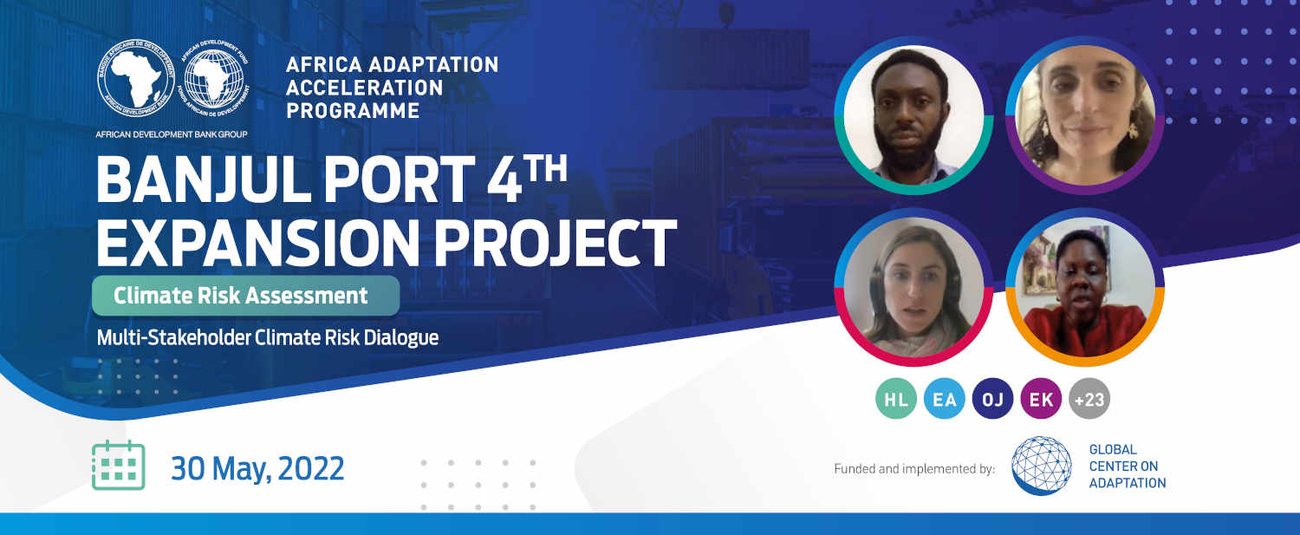
The African Development Bank and the Global Center on Adaptation hosted a virtual dialogue on Monday last week to discuss climate adaptation related to the Port of Banjul Fourth Expansion Project in Gambia.
The proposed project will increase cargo handling and storage capacity of the terminal in order to cope with increasing cargo volumes and trade.
The dialogue was attended by officials from Gambia’s Port Authority, the National Environment Agency, the National Roads Authority, the Department of Fisheries, the Department of Parks and Wildlife Management, the Department of Water Resources, Maersk Line Gambia, clearing and forwarding agency HM Trading, the Great Institute and civil society. The discussions centered on the climate hazards the Port of Banjul is exposed to, and the impact of these hazards on the Port’s assets, operations, and services.
The African Development Bank and European Investment Bank are considering financing the proposed expansion of the Port of Banjul, estimated at $114 million. To this end, the African Development Bank has committed $531,275 to the Gambia Port Authority to finance a feasibility assessment and investment preparation studies to lay the groundwork for the project.
Within the framework of the Africa Adaptation Acceleration Program (AAAP) – a partnership between the African Development Bank and the Global Center on Adaptation (GCA), GCA is providing technical
assistance worth around €200,000 to mainstream climate resilience into the Expansion Project, utilizing cutting-edge climate analytics to identify and quantify the impacts of physical climate risk on the investment and provide adaptation investment options to climate-proof the investment.
The findings from the climate analytics revealed that climate hazards could lead to cumulative economic damage to the Port of Banjul estimated at $27 million over the next 30 years. This is about 23% of the estimated investment required to upgrade the Port of Banjul. It also emerged that the Port could lose up to 3% of its revenue annually due to the impacts of physical climate risks.
Gambia - Banjul Port 4th Expansion Project
The Banjul Port 4th Expansion Project aims to enhance port infrastructure capacity, facilitate trade facilitation and regional connectivity in the West African sub-region. This regional infrastructure project will enhance economic growth and poverty reduction whilst reducing the transaction costs associated with regional trade. The proposed Banjul Port expansion and modernization Project will also serve as a catalyst for strengthening The Gambia’s position as a major trade and transport corridor hub within the West Africa sub region.
The Port expansion aims to support the economic development of The Gambia, by enhancing its strategic position and competitiveness as a transit and trans-shipment hub in the wider West Africa region.
- Utilizing cutting-edge climate analytics to identify and quantify the impacts of physical climate risk on the investment
- Delivering high resolution climate risks assessments, adaptation and resilience investment options to climate-proof the investment against the impacts of physical climate risks
- Extension of the port jetty by 345 meters to accommodate up to three ships simultaneously instead of one currently
- Provide for the expansion of the container terminal area by 22,000 m2 to create space for unloading ships
- Replacement of a non-functioning ferry plying the Banjul and Bara crossing and widening port access roads by 3km to ease congestion
- Complete and widen the Bund Road access to facilitate traffic flow in and around the access roads leading to the Port of Banjul
- Relocate its current Head Office Complex away from the main operational zone
- Construct a new Container Terminal
- Procurement of Information and communication processing systems for efficient linkages between customs and the terminal operating system
- Significantly reduced ship turnaround time and cut costly congestion and surcharges, enabling reductions in sea freight costs and demurrage payments
- Boost the facility’s capacity to meet growing traffic and improve efficiency in operations and management as it digitizes its procedures
- Climate-friendly and climate-resilient port infrastructure by introduction of green and low-carbon emission ferries
- Empower women's groups through gender-sensitive procurement and provide jobs, especially for the youth
AfDB Investment of USD 44.5 Million of total USD 115 Million
Reinforcing Resilience to Food and Nutrition Insecurity in the Sahel (P2-P2RS)
The Sahel, which lies between the Sahara Desert to the north and tropical savannas to the south, is one of the largest semi-arid/arid sub-regions globally. As such, the region is highly vulnerable to climate change and other uncertainties. The impacts of climate change may have critical socio-economic consequences for the Sahel, including poor agricultural yields, increased frequency of natural disasters. Already, the number of people in the Sahel suffering from chronic food and nutrition insecurity, poverty and vulnerability to the effects of climate change is rising steadily.
A lasting solution to food and nutrition insecurity in the Sahel requires building resilience to climate change, long-term agricultural sector financing and developing trade and regional integration. Sustained, longer-term investments in household resilience can significantly reduce the cost of emergency assistance, ultimately breaking the cycle of recurring famine. This is the most cost-effective intervention option which meets the basic needs and preserves the dignity of the populations of the Sahel. This idea is central to the Programme to Build Resilience to Food and Nutrition Insecurity in the Sahel (P2RS)
The overall objective of the P2-P2RS is to contribute to the substantial improvement of the living conditions and the food and nutritional security of the populations of the Sahel region.
Specifically, the program aims to i) strengthen the resilience to climate change of agro-sylvo-pastoral producers, including through promotion of climate-smart agricultural technologies in the Sahel and the development of climate intelligent villages; ii) develop the agro-sylvo-pastoral value chains, including through the development and improvement of hydro, meteorology and climate services; and iii) support regional institutions (CILSS, APGMV, CCRS) to strengthen adaptive capacity in the Sahel.
- Design digital adaptation solutions (Digital Climate Advisory Services, DCAS) for the Sahel context
- Investment readiness and infrastructure, institutional and farmer capacity needs for DCAS
- Feasibility study to integrate DCAS into agricultural extension and agrometeorological advisory to smallholder farmers and pastoralists
- 1 million rural households have access to digital or data-enabled climate-smart technologies
- 500,000 smallholders have adopted adaptation practices
- 5 million smallholders have access to climate services;
- Development and improvement of hydro, meteorology and climate services
- The development of climate-intelligent villages
- Promotion of climate-smart agricultural technologies in the Sahel
- Resilience to food and nutrition security built for the targeted populations
USD 300 million
Global Leaders Rally Support and Finance for the Africa Adaptation Acceleration Program to Tackle Climate Change in Africa
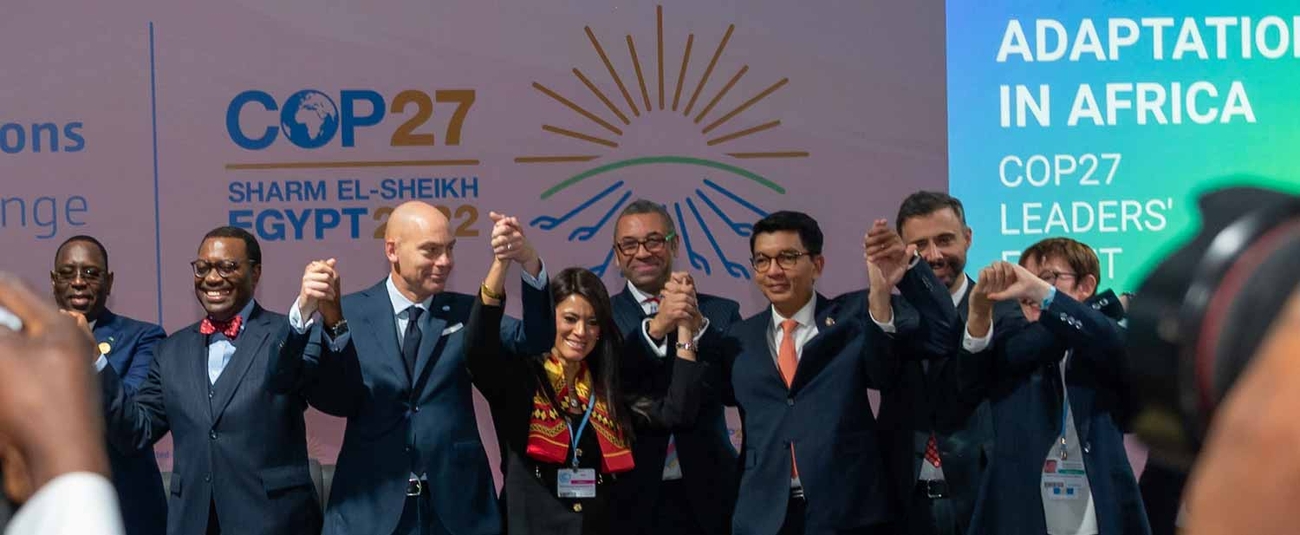
Global leaders on Tuesday rallied around climate adaptation for Africa. They attended the Africa Adaptation Leaders’ Event, convened by African Union Chair President Macky Sall of Senegal, Global Center on Adaptation CEO Patrick Verkooijen, and African Development Bank Group President Akinwumi Adesina.
The event took place at the global climate summit (COP27) in Sharm El-Sheikh, Egypt. It underscored the critical need for climate adaptation in Africa and responded to the call for the capitalization of the Africa Adaptation Acceleration Program (AAAP).
“This is a pivotal step in the fight against climate change,” African Union Chair President Macky Sall said. “The commitments made by Africa’s partners will give the Africa Adaptation Acceleration Program the boost that it needs to transform the development trajectory of the world’s most climate exposed continent. I am confident in the ability of the AAAP to deliver results for Africa.”
The Africa Adaptation Acceleration Program is an Africa-owned and Africa-led initiative developed by the Global Center on Adaptation (GCA) and the African Development Bank (AfDB) in close collaboration with the African Union. It serves as the implementation of the Africa Adaptation Initiative (AAI) to mobilize $25 billion to implement, scale and accelerate climate adaptation across the Africa. Since 2021, AAAP has mainstreamed climate adaptation in over$3.5 billion of investments in 19 countries.
United Nations Secretary-General António Guterres said: “I want to express my total solidarity for the Africa Adaptation Acceleration Program […] I urge the international community to support Africa to mobilize the technical & financial resources for scaling up transformative adaptation.”
“With this innovative program, Africa has developed a plan to grow, create jobs and opportunities for people, and to be resilient against the climate crisis,” said President Akufo-Addo of Ghana. “AAAP’s singular focus on the issue of climate adaptation will also contribute to greater stability and progress in Africa and around the world. AAAP is aligned with Ghana’s plans to address climate change as it chairs the Climate Vulnerability Forum (CVF) to lead efforts from the world’s most climate vulnerable countries to spur and mobilize investment through the Climate Prosperity Plans."
James Cleverly, Secretary of State for Foreign, Commonwealth and Development Affairs of the United Kingdom announced that the UK will provide £200 million to the African Development Bank’s Climate Action Window. This is in addition to the £20 million announced at COP26 in Glasgow to the AAAP Upstream Financing Facility.
Cleverly noted: “Climate change is having a devastating impact on countries in Sub-Saharan Africa facing drought and extreme weather patterns, which have historically received a tiny proportion of climate finance. This new mechanism […] will see vital funds delivered to those most affected by the impacts of climate change, much more quickly.”
Prime Minister Mark Rutte of the Netherlands followed through on the commitment made at the Africa Adaptation Summit held at the Global Center on Adaptation in September to confirm that the Netherlands will contribute EUR110 million to the AAAP, with EUR10 million in support for the Upstream Financing Facility hosted by GCA and EUR 100 million for the Climate Action Window of the African Development Fund at the African Development Bank as part of the Netherlands’ commitment to dedicate half of its climate funding, fully grant based, to climate adaptation, with a focus on Africa.
Norwegian Prime Minister Jonas Gahr Støre echoed African leaders’ calls for countries to rapidly scale up finance for climate adaptation, stating: “The climate crisis is here and now. Years of progress are at risk.”
“The AAAP Upstream Financing Facility is the delivery mechanism of adaptation and will use millions to leverage the billions that is required for adaptation,” he continued. “AAAP projects will generate effective climate adaptation outcomes. Adaptation is a growth agenda. A jobs agenda. And a prosperity agenda. On behalf of Norway, I am looking forward to continuing this partnership, investing in it, and supporting it with the Global Center on Adaptation.”
International Monetary Fund Managing Director Kristalina Georgieva emphasized the need to accelerate adaptation in Africa, stating: “It is paramount to support Africa’s adaptation because Africa will not reach its tremendous potential without it. AAAP complements the IMF’s Resilience and Sustainability Trust, which helps countries address external shocks such as climate change and ensure sustainable growth that can give Africa a chance to leapfrog outdated development models.”
African Development Bank Group President Dr. Akinwumi Adesina said: “Africa is suffering from the devastating effects of climate change. Our continent is being short changed by climate finance. The contributions towards the Africa Adaptation Acceleration Program’s Upstream Financing Facility and the Climate Action Window – which the African Development Bank manages – will help capitalize the program. With increased capital, we can better deliver the investment needed to bridge the adaptation finance gap. We want to ensure that the most vulnerable communities can benefit from a sustainable and prosperous future.”
Endorsing the outcomes of the high-level meeting, Patrick Verkooijen, CEO of the Global Center on Adaptation, closed with a statement emphasizing the AAAP’s impact to date, noting that “there is no pause button on the climate crisis. Africa must adapt to the threat of climate change, and it must adapt now.”
“Through the AAAP,” he continued, “Africa has charted its path towards a climate-resilient future for its youth, its economic growth, and for its prosperity.”
About the Global Center on Adaptation
The Global Center on Adaptation (GCA) is an international organization which works as a solutions broker to accelerate action and support for adaptation solutions, from the international to the local, in partnership with the public and private sector, to ensure we learn from each other and work together for a climate-resilient future. Founded in 2018, GCA is hosted by the Netherlands, working from its headquarters in Rotterdam with a knowledge and research hub based in Groningen. GCA has a worldwide network of regional offices in Abidjan, Côte d’Ivoire, Dhaka, Bangladesh and Beijing, China. Through this evolving network of offices and global and regional GCA teams, the organization engages in high-level policy activities, new research contributions, communications, and technical assistance to governments and the private sector.
About the African Development Bank
The African Development Bank Group is Africa’s premier development organization. Its overarching objective is to spur sustainable economic development and social progress in its regional member countries, thus contributing to poverty reduction across the continent.
The Bank Group achieves this objective by mobilizing and allocating resources for investment in African countries and providing policy advice and technical assistance to support development efforts.
In 2015, all multilateral development institutions agreed on the same set of objectives, the United Nations Sustainable Development Goals.
Learn more: https://www.afdb.org/
About the Africa Adaptation Acceleration Program
The Africa Adaptation Acceleration Program (AAAP) is a joint initiative of the African Development Bank and the Global Center on Adaptation (GCA). It aims to mobilize $25 billion, over five years, to accelerate and scale climate adaptation action across the continent. This ambition is delivered through the AAAP Upstream Financing Facility managed by the Global Center on Adaptation and the African Development Bank’s climate action window in the ADF replenishment. AAAP works across four pillars to achieve transformational results: Climate-Smart Digital Technologies for Agriculture and Food Security; African Infrastructure Resilience Accelerator; Youth Empowerment for Entrepreneurship and Job Creation in Climate Adaptation and Resilience and Innovative Financial Initiatives for Africa. AAAP has already guided over $3.5 billion of upstream investments in 19 countries with every dollar spent influencing $100 downstream.
COP27 - COP27 Leaders' Event, Accelerating Adaptation in Africa (DAY 2)
COP26 Leaders’ Event – Africa Adaptation Acceleration Summit
What: COP26 Leaders’ Event – Africa Adaptation Acceleration Summit
Where: Meeting room 4, Zone F (in front of plenary rooms)/ also available on livestream here: https://bit.ly/31nTtIW
When: 14:15-15:45 on Tuesday 2nd November
Followed by press conference
When: 16:00-16:30
Where: Press Conference Room Durdle Door, Area D - Ground Floor
The future of Africa depends on global action and firm resource commitments to support climate adaptation. The recent IPCCC report highlighted the continent is the most vulnerable to climate change. The Africa Adaptation Acceleration Summit is the moment at COP26 for African heads of state and government to outline how they are ready to play their part to build resilience across the continent. They will outline the commitments made and the actions required by global partners for a sustainable future.
Confirmed speakers
Host’s Keynote address
Félix Tshisekedi, President of the Democratic Republic of Congo and Chair of the African Union
Keynotes
- António Guterres, Secretary-General of the United Nations
- Bill Gates, co-Chair of the Bill & Melinda Gates Foundation
- Akinwumi Adesina, President of the African Development Bank Group
- Antony Blinken, U.S. Secretary of State
- Kristalina Georgieva, Managing Director of the International Monetary Fund
- Ngozi Okonjo-Iweala, Director-General of the World Trade Organization
- Alok Sharma, President for COP26
Leaders’ interventions
- João Lourenço, President of Angola
- Mokgweetsi Masisi, President of Botswana
- Évariste Ndayishimiye, President of Burundi
- Jorge Carlos Fonseca, President of Cape Verde
- Faustin-Archange Touadéra, President of Central African Republic
- Azali Assoumani, President of Comoros
- Adama Barrow, President of Gambia
- Nana Akufo-Addo, President of Ghana
- Umaro Mokhtar Embaló, President of Guinea Bissau
- Uhuru Kenyatta, President of Kenya
- Andry Rajoelina, President of Madagascar
- Lazarus Chakwera, President of Malawi
- Filipe Nyusi, President of Mozambique
- Mohamed Bazoum, President of Niger
- Muhammadu Buhari, President of Nigeria
- Paul Kagame, President of Rwanda
- Wavel Ramkalawan, President of Seychelles
- Julius Maada Bio, President of Sierra Leone
- Samia Suluhu Hassan, President of Tanzania
- Faure Gnassingbé, President of Togo
Moderation
Patrick Verkooijen, CEO of Global Center on Adaptation
COP27: UK triples its pledges for Africa’s climate adaptation projects
Millions pledged at Africa adaptation acceleration event
African, other world leaders gather for largest summit on climate adaptation at COP26
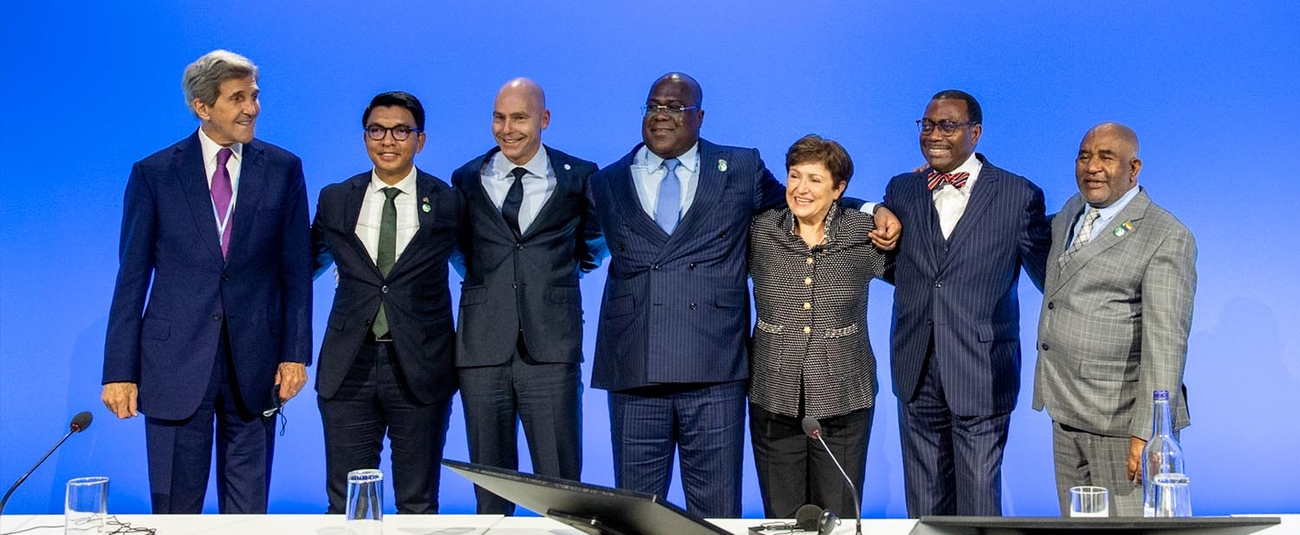
African and other global leaders came together at COP26 in Glasgow yesterday for the Africa Adaptation Acceleration Summit, the largest summit to date on climate adaptation.
The summit called for the rest of the world to ramp up its support for the African continent as it adapts to the adverse effects of climate change, including devastating human impacts in Madagascar, where 1.3 million people live under food distress following four years of no rain. Madagascar’s situation has been described as the first climate induced drought.
President Félix Tshisekedi of the Democratic Republic of Congo and Chairperson of the African Union led Tuesday’s event. He highlighted the $6 billion in financial commitments for climate adaptation that African countries had put forward in their nationally determined contributions (NDCs) and called for increased funding to produce the additional $27 billion a year that the continent requires.
President Tshisekedi said: “Adaptation finance flowing to Africa is grossly insufficient compared to the enormous resources needed for the continent to adapt to climate change. That is why African countries, working with the Global Center on Adaptation, the African Development Bank, and other partners, launched the Africa Adaptation Acceleration Program (AAAP). The program lies at the heart of Africa’s climate change needs. It is Africa-owned and Africa-led. African nations have endorsed it as Africa’s preferred mechanism to deploy adaptation finance for adaptation projects in Africa.”
African Development Bank Group President Dr Akinwumi A. Adesina said: “The Africa Adaptation Acceleration Program is a game changer for Africa to deliver results and impacts on adaptation, fast and at scale. It will support 30 million farmers with digital climate advisory services. The Technologies for African Agricultural Transformation program supported by the African Development Bank and the Bill and Melinda Gates Foundation has already delivered climate resilient technologies for 11.2 million farmers in just two years.”
He added: “With the Africa Adaptation Acceleration Program, we expect to reach 40 million farmers. We plan to support farmers in producing 100 million metric tons of food, which will be enough to feed 200 million people and reduce hunger by 80%.”
Moderating summit proceedings, Patrick Verkooijen, CEO of the Global Center on Adaptation, underscored the urgent need for accelerated climate adaptation action across the continent: “COP26 must deliver on the promises of Paris,” he said. “We are failing and we are failing Africa. We must bring more ambition and more finance to help Africa adapt to the pace of a climate emergency devastating the continent with increasingly serious consequences for the world’s poorest and most vulnerable,” the GCA CEO added.
COP26 President Alok Sharma announced $197 million in new funding for adaptation for Africa from the UK government. Of this amount, $27 million will support the Africa Adaptation Accelerated Program upstream facility to deliver technical assistance and a pipeline of bankable projects. The package is expected to unlock almost $1.2 billion for climate adaptation in Africa. Sharma said there will be more to come.
US Secretary of State Antony Blinken also announced new funding for climate adaptation from the United States government. He said the US President would work with the US Congress to dedicate $3 billion annually in adaptation finance by the year 2024. This is the largest commitment ever made by the US to reduce the impact of climate change in those most endangered by it around the world.
Global and African Leaders Welcome Launch of GCA Africa as “Historic Moment to Accelerate Adaptation” on the Continent
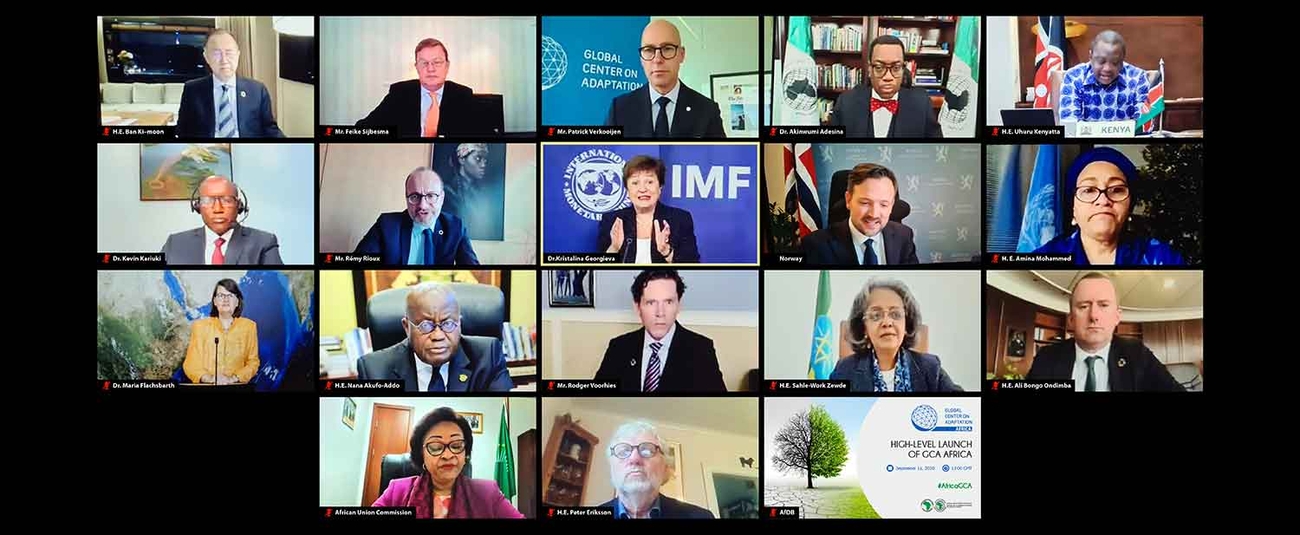
The Global Center on Adaptation today announced the launch of its regional office in Côte d’Ivoire.
Hosted by the African Development Bank at its headquarters in the Ivorian capital Abidjan, GCA Africa will work with partners across the continent to scale and accelerate adaptation action that protects African communities from the impacts of climate change.
GCA Africa will focus on programs and action, knowledge acceleration and capacity building and agenda-setting that respond to the acute challenges from the changing climate facing African countries.
The GCA Africa programs include improving the food security of one billion people in Sub-Saharan Africa by 2030 through a program on rural well-being and food security, as well as projects to support communities through water for urban growth and resilience; using nature for more resilient infrastructure; adaptation finance and building youth leadership.
Commenting on the launch, Ban Ki-moon, Co-Chair of the Board of the Global Center on Adaptation and 8th Secretary-General of the United Nations said:
“This is a historic moment to accelerate adaptation in Africa. Nowhere is the challenge of achieving sustainable development in the face of a changing climate more acute. Our new regional office will support regional and national adaptation efforts by emphasizing and spreading existing best practices on the continent and ensuring their fully fledged integration into broader international adaptation efforts”.
Dr. Akinwumi Adesina, President of the African Development Bank said:
“I am delighted with the launch today of the Global Center on Adaptation for Africa (GCA) hosted by the African Development Bank. The Bank has committed to doubling its financing for climate to $25 billion by 2025, with over 50% devoted to climate adaptation. Africa must not be short-changed by global climate finance. We will partner with the GCA to mobilize more resources for climate adaptation in Africa.”
Ali Bongo Ondimba, President of Gabon and Chair of the African Adaptation Initiative said:
“The devastating effects of climate change, which include severe droughts, floods, reduced agricultural yields, sea-level rise, and other climate-related disasters, are on the rise. The launch of GCA Africa is a bold and innovative initiative to galvanize the support needed to significantly scale up adaptation on the continent, identify gaps and connect regional partners to find solutions.”
Quotes from other partners:
Kristalina Georgieva, Managing Director, International Monetary Fund said:
“More than any other region, sub-Saharan Africa is vulnerable to the impact of climate change, which threatens lives and livelihoods and undermines economic growth. After the current crisis, boosting resilience is an urgent priority so it’s vital we share the knowledge and best practice that can help accelerate climate adaptation.”
Amina J. Mohammed, Deputy Secretary General of the United Nations said:
“There is an urgent need to step up the support for people in Africa, and around the world, affected by climate change. I welcome the Global Center on Adaptation Africa as a crucial partner in delivering the elevated ambition and enhanced action that is needed to make this shift towards a resilient future.”
Feike Sijbesma, Co-Chair of the Board of the Global Center on Adaptation and Honorary Chairman of Royal DSM said:
“Millions of lives depend on Africa’s agricultural sector. Adapting and improving its resilience to climate change is therefore a must. By investing in African local food systems we catalyze sustainable value chains and support the vulnerable but small-scale often female producers.”
Nana Akufo-Addo, President of Ghana said:
“Adaptation to the impact of our changing climate is essential if Ghana is to continue to grow and prosper. We look forward to working with GCA and its partners to meet the challenge of climate change and ensuring resilience is built into Africa’s economic recovery plans.”
Dag-Inge Ulstein, Minister of International Development for Norway said:
“Climate change is not only damaging for the environment, but devastating also for development. It is important that countries around the world, especially our partners in Africa, work together to address these global challenges. Norway is pleased to be able to support GCA Africa in accelerating this agenda.”
Peter Eriksson, Minister for International Development Cooperation for Sweden said:
“GCA is a key solutions broker and center of excellence with a holistic approach that aims to accelerate adaptation solutions for a climate-resilient future in Africa. By working with GCA Africa we will intensify climate adaptation efforts to ensure we integrate solutions to have a coherent response to our climate emergency.”
Patrick Verkooijen, CEO of the Global Center on Adaptation said:
“The impacts of climate change are already being felt across Africa and will only increase in magnitude. Adaptation is not a nice-to-have, it’s a necessity. Through our role as a solutions broker, GCA Africa will work closely with partners in every sector to ensure the most effective adaptation measures are shared and scaled across the continent, responding to the growing demand for strengthening resilience to the impacts of our changing climate.”
The launch of GCA Africa comes shortly after the launch of its South Asian office in Dhaka by Prime Minister Sheikh Hasina in September 2020. Its first regional office was launched in Beijing by Premier Li Keqiang in June 2019.
In May 2020, GCA Africa published a GCA policy brief(link is external), with the African Adaptation Initiative and endorsed by 54 Heads of State and Government, which recommended focusing stimulus investment in Africa on resilient infrastructure and food security to overcome the COVID-climate crisis.
The GCA is the lead partner institution for the Climate Adaptation Summit in the Netherlands – the first major gathering of international leaders dedicated entirely to adaptation. The summit takes place on 25 January 2021 and is hosted by Prime Minister Mark Rutte of the Netherlands. The GCA is also the Managing Partner to the Climate Vulnerable Forum and Vulnerable Twenty (V20) Group of Ministers of Finance, a group of 48 developing countries highly vulnerable to climate change.
Watch the launch at the following links:
About the Global Center on Adaptation
The Global Center on Adaptation (GCA) is an international organization which works as a solutions broker to accelerate action and support for adaptation solutions, from the international to the local, in partnership with the public and private sector, to ensure we learn from each other and work together for a climate resilient future. Founded in 2018, the GCA is hosted by the Netherlands. Through an evolving network of offices and global and regional GCA teams including a global innovation hub for climate adaptation launched by Premier Li Keqiang in Beijing, the organization engages in high-level policy activities, new research contributions, communications, and technical assistance to governments and the private sector.

